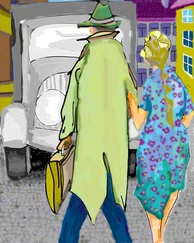Still, she was thankful her obsession had run its course. She was no longer “in love” with either Mrs. Wilding. She turned on her side, away from Derek, and drifted off…
In the dream, Tristen was in the passenger seat. They were driving to Whole Foods on a sweetly boring day. Everything was uneventful, sunlit and divine. It felt good to have him with her again, even though she had an awareness in the dream that he was dead. He spoke boyishly; she couldn’t make out his words. He wore jeans and was shirtless. It didn’t bother her that his chest was gutted — the inside-outs were slick and clean, painted a deep maroon, hard-rubbery, like the anatomical model in science class when she was a girl. Larissa began getting uncomfortable in her body as she strained to understand what he was saying. She couldn’t breathe. She felt pressure now, and winced in pain behind the wheel — when she awakened, Derek was heavy on top of her. She startled, then let him keep fucking her.
She felt her son’s heart pound against her own.
—
She bathed her little girl, something that calmed them both. Aurora loved a bath more than she loved the pool, and Dusty thought that was because the tub was fun but the pool was work —all that resistance-training the therapists demanded (with peace and love). She thrilled when Mama drew the giant sea sponge over her skin, squeezing out the warm, soapy water.
She examined Aurora’s body closely, noting its small and larger transformations. The leg was healing well; the white scar from the incision over once-infected bone looked like the bleached, toothy nose of a sawfish. Coarse black hairs had begun to sprout topside between ankle and knee, like blades of grass after a fire. The other breaks were healing remarkably well. The shoulders were lopsided from the awful dislocation (it would never be totally right) and a foot arched cartoonishly, causing a slight limp. Her midsection had thickened as an effect of the meds, and also because she’d been eating like a draft horse since she was home. The weight gain hadn’t distributed evenly — her legs remained spindly from the weeks spent in coma and her rear end suffered accordingly, grown wasted and slabby — steroids had provided a classic moonface. The staph-infected bedsore that threatened her life when in hospital had completely closed and all that was left was the pinkish crater of a dead volcano. Dusty washed her privates like a mother would her babe’s, making Aurora giggle and squirm, and Dusty laughingly chide. Sometimes when they lay in bed and she sang the girl a lullaby, Aurora reverted to the self-calming frottage she once practiced as a girl, and Dusty would stop her, gentle yet firm, flashing for a moment on the pride and care Allegra used to lavish on the waxing and manicuring of those nether parts, now overgrown and homogeneous. And the face: that gorgeous face! So different now, always changing yet somehow still the same, still her love, her lunar child — still her wife, in a way, forever and always — avid in its familiarity and otherness, the disorganized, perfect features like a valentine from Eternity. They’d capped the teeth that broke against the pot; thank God Aurora had been unconscious when so much knitting and rebuilding had to be done. There’d been sieges of cystic acne in the last few months, worsened by Allegra’s compulsive, scratchy explorations — her nails had to be clipped way back. But the cosmetician who came each week doted over and nourished the lovely skin, and just now, as she bathed her, it had sloughed pristine. The hair on the head had grown out. It was vibrant and gorgeously cut, and grew wilder than ever, as if willfully asserting its independence of all that was ravaged.
And how Dusty adored that milky eye!
Like the rarest of marbly gems, rolling from the recesses of an Egyptian tomb to land eerily at the foot of a humbled explorer.

The cottage — Dusty referred to it by that architectural misnomer — was in Somerset, just outside Bruton, which is to say not a far soak from Bath, nor farther still from Glastonbury, as the starling flies; though the birds did tend toward a more vertical migration, ascending in helices so dense and perfect one could easily imagine the hand of God tugging them home.
“The humble abode,” as she called it in dry-wit emails to Jeremy, was actually a seventeenth-century Grade II — listed manor along with outbuildings for staff and guests, though in the nearly three years they’d lived there, guests had been few and far between. Shetland sheep, Old Spots, and Gloucester cattle were more common, having run of the property, which gave Aurora (who had no memory of ever being called anything else) and the other mistress of the house great, giddy pleasure. The carriage entrance of the two-story, slate-roofed stable block of paneled stalls and mangers was grazed by an unexpectedly elegant frieze and cornice; adjacent was a heaven-sent paddock; venturing beyond, one found oneself in the dream of a Grade II — listed garden with a weather-worn Grade II — listed gazebo, graffitied by Aurora herself with fancied words and phrases of the hour. The whole affair — all twenty-five acres of it — was enclosed by a crinkle-crankle wall, whose bricks often wore a necklace of soft, hanging fruit, and wove a charming cuff of talismanic protection around the property’s borders.
With its stone abbey, stone bridges, and stone streets, its medieval chapels and graveyards older and stonier still, its endless succession of weddings between rolling hill and sky (officiated by that which pulls the starlings) — marriages that weathered all manner of domestic ecstasies and abuse — with the glittering river that stood in for the cathedral train of all those bridal gowns, and its towering dovecote famously presiding over all, the Paleolithic county’s genius loci resounded like the celestial pieces of a lost, cherished reverie the actress had finally gotten to match.
It was more than a new life — it was home, and always had been.
Apart from the generous staff required to manage the farm and its environs, the mistresses employed a Badminton-born cook and Pucklechurch pastry chef, nannies from Axminster and Temple Cloud, a Dean hamlet swim trainer, an equine therapist from the Vale of Evesham (Aurora was never more her old self when being led along on a horse), and all manner of visiting tradespeople, from masons and apiarists to artisans of stained glass. Yogis were entrusted to soothe Aurora’s finickiness, while other practitioners, schooled in massage, Pilates, and the Alexander Technique, did their best to fill the potholes of recovery, pouring in enough holistic gravel to keep the fair semblance of a navigable road. Dusty’s bimonthly Saturday night musicales — Aurora gleefully dubbed them hootenannies —were a major hit with the villagers (who couldn’t have given two shits about her celebrity nor anyone else’s) and already felt like ancient rural tradition. On Sundays, mums rallied the broods for arts and crafts. Dusty built a small amphitheater where mimes, jugglers, and marionettistes held court; fanciful theater productions tapped a rich local vein of natural (and unnatural) talent, booking thespians of all ages, from squalling newborns to village wallflowers who’d managed to locate, and passionately liberate, their inner Judi Dench.
Dusty stayed away from America and had no yearning to go back. The gossipy national Sturm und Drang recycled into a new mythology: the iconic star breaking ground yet again in her latest role as the selfless caregiver who, in defiance of the prevailing rules of throwaway culture, refused to abandon her spouse, her mate, her ladylove. The macabre fairy tale had all the elements of a pop passion play and served as a kind of there-but-for-the-grace-of-God telenovela for the masses, a confessional and general bloodletting with built-in dispensation; the actress, crucified and in exile (in the name of love!), became a dashboard saint touched for luck while navigating one’s own dark night of the unrequited, lovelorn soul. It gave sacrificial solace. Dusty didn’t feel like a martyr, not remotely, but the world’s ghoulish, sentimental spin on her tragedy, uncomplicated by the even more tragic truth, allowed her to hide in plain sight. For the most part the press respectfully let her be. She hadn’t acted since Bloodthrone 2 (they did rent that place in the Cotswolds, and her daughter did just fine; Elise was right, as usual), a heroic absence that garnered more praise than controversy. She’d been talking with her manager about the idea of producing, maybe even directing. When Angelina visited a few months earlier, her enthusiasm about the experience of Unbroken was inspiring.
Читать дальше













